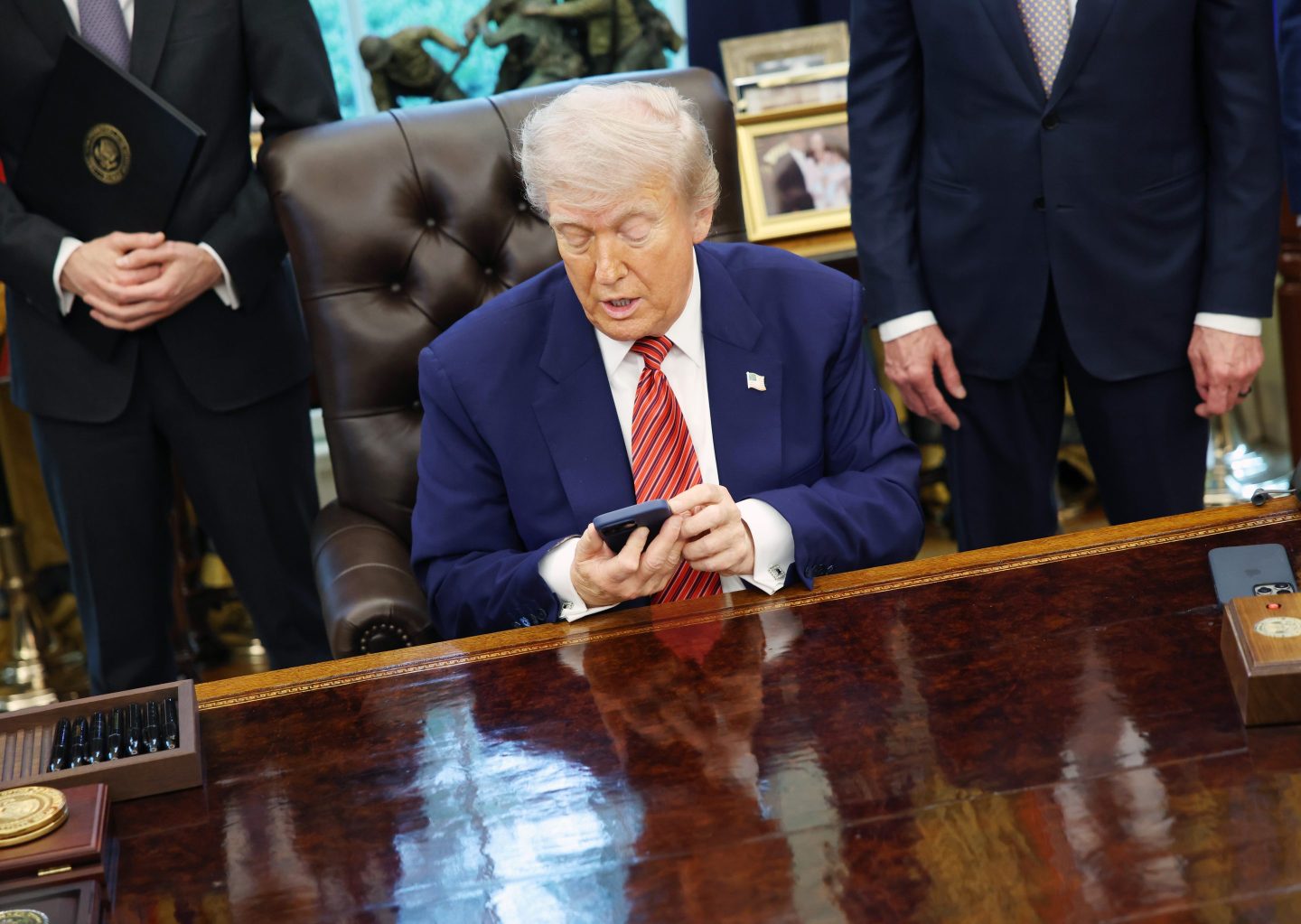- The Trump Organization announced a $499 smartphone “built in the United States” but analysts believe it will likely be manufactured in China. Experts have long warned the U.S. Is incapable of creating its own manufacturing infrastructure quickly and cost-effectively. More likely, the Trump Organization will import phone components made in China to the U.S. To be assembled domestically.
Analysts and supply-chain experts are not sold on the Trump Organization touting its new smartphone as being “built in the United States,” saying it’s far more likely the $499 device will actually be produced in China.
The Trump Organization, the Trump family’s real estate, hospitality, and entertainment conglomerate, announced on Monday it would license its name to a wireless service called Trump Mobile and its gold-colored “T1” smartphone is slated for an August release. The device will use a wireless provider dubbed Liberty Wireless and will operate on the Google Android operating system.
The Trump Organization’s announcement touted the phones as “proudly designed and built in the United States,” but analysts said it’s more likely the conglomerate is outsourcing manufacturing capabilities to an original device manufacturer (ODM) overseas, as least in the short term, as the U.S. Does not have the manufacturing capabilities to build the phone.
“Despite being advertised as an American-made phone, it is likely that this device will be initially produced by a Chinese ODM,” Blake Przesmicki, an analyst at Counterpoint Research, said in a note published Monday.
Even if the U.S. Did have smartphone production capabilities, he said, the company would have to rely on components imported from overseas.
The Trump Organization did not respond to Coins2Day’s request for comment.
Trump Organization executive vice president Eric Trump, for his part, admitted Trump Mobile would not initially be an entirely domestic endeavor.
“Eventually, all the phones can be built in the United States of America,” Trump said on The Benny Show podcast on Monday, suggesting the device is being produced or assembled overseas before its August launch.
Manufacturing limitations
President Donald Trump has tried to jump-start domestic manufacturing by imposing sweeping tariffs, but experts have long warned of the U.S.’s production limitations. Apple, for example, set up its supply chain in China in the 1990s, and moving it would require extensive sourcing substitutions and increased labor costs that would drive the cost of a U.S.-made iPhone to more than $3,000, Wedbush Securities analyst Dan Ives previously said.
These barriers to expanding U.S. Production are nearly universal in the industry, according to Przesmicki.
“Generally, no phones have been manufactured in the U.S. Since the 2G era in over a decade,” Przesmicki told Coins2Day. “We have weaker supply chains, fewer capable employees in the smartphone sector, lower margins.”
Przesmicki suggested if any manufacturing of Trump-branded phones were to take place on American soil, it would be on a small scale, about 1,000 phones or fewer. Leo Gebbie, principal analyst at CCS Insight, told Coins2Day there’s “no serious chance” the Trump Organization has arranged for U.S. Production of the T1 phones, especially before the August launch.
“The idea that this could be replicated in the U.S. In any sort of short- to medium-term time scale is fanciful,” Gebbie said. “It is an absolute pipe dream.”
Instead, according to Gebbie, the T1 phones will likely have their final assembly stage in the U.S., which would allow the company to avoid steep investments in domestic manufacturing by simply importing all components. This strategy, he said, could be closer to what the Trump Organization intended when it hailed phones “built” in the U.S.
Trump not immune to his own tariffs
The importing of phone components, the majority of which are made in China, would provide another supply-chain hiccup for the Trump Organization by making it susceptible to tariffs Trump imposed for the express purpose of discouraging trade with China.
“This absolutely does raise the specter of the Trump Organization mobile falling foul of the tariffs that have been instigated by the Trump administration,” Gebbie said.
“Ultimately, whether we’re talking about screens, whether we’re talking about camera technologies, whether we’re talking about chipsets and processors and smartphones, almost all of this comes from the same manufacturing hubs in Asia,” he added.
The president last month threatened a 25% tariff on smartphones not produced in the U.S. And lambasted Apple for producing its iPhone in India—where it makes about 20% of its total output. Trump warned he would impose a 25% levy on Apple products if the company does not move manufacturing to the U.S.
Apple announced in February it would invest $500 billion in expanding U.S. Plants over the next four years.
Gebbie suggested the Trump Organization’s emphasis on building its phone in the U.S—despite domestic manufacturing being unlikely—is to send a message to big companies that U.S. Smartphone assembly is possible.
“Maybe it provides leverage for the Trump administration to go out to device makers like Apple and Samsung and say, ‘Hey, we are marking smartphones in the U.S. Why aren’t you?’” Gebbie said.













